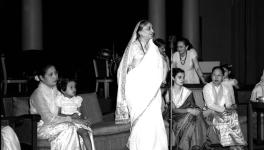Why Gandhi’s School Text Book ‘Bal Pothi’ on Gender Equality at Home is Significant Today

Representational image | Image courtesy: Knot9
In 1922, Mahatma Gandhi wrote Bal Pothi, a text book for school children containing small chapters, one of which was on household work. Gandhiji, through that book, wanted to generate a mindset among students that a home belonged to both men and women and therefore, household work was a joint responsibility to be undertaken by both male and female members of the family. This sharing of household work would herald a new era of gender equality, was stressed by Gandhi in the second decade of 20th century when there was hardly any movement challenging patriarchy at home. When that book was circulated among his associates, all of them protested, stating that it would bring about a rebellion in the family.
‘Bal Pothi’ Invoked on International Women’s Day in 1999
In 1999, the then first lady of India, Usha Narayanan, while addressing a meeting of women on the occasion of International Women’s Day, referred to Gandhi’s Bal Pothi and gave a detailed account of that chapter on household to drive home the point that Gandhi upheld the cause of gender equality at home by teaching school children that housework should never be the exclusive preserve of women, and men and boys in the family should also share that work.
Usha Narayanan’s speech was covered by the Hindustan Times, a leading newspaper of Delhi, and it in box item under the caption ‘Bal Pothi’, it gave adequate coverage to the idea that Gandhi talked about and the necessity of men and women in the family doing the household chores.
The news item attracted the attention of late socialist leader Madhu Dandavate, who wrote a letter to the then Human Resource Development Minister, Murli Manohar Joshi, and requested him to translate Bal Pothi into all languages and introduce it in school curriculum in all states for character building and education of children. It is ironic that Prof. Dandavate did not get a reply from the Minister concerned. That spoke volumes for the gender sensitivity of the Minister concerned, who was holding the portfolio of HRD at the national level.
Shabana Azmi Raised Gender Stereotypes in Text Books in 2002
In 2002, celebrated film actor Shabana Azmi, as a Rajya Sabha member, participated in a discussion on International Women’s Day. While doing so, she expressed concern that school textbooks contained gender bias. To prove that point, she referred to the textbooks for standard I children of a state where there was a question “Where is mother?”, and its answer was that “Mother is in the kitchen”. And the answer to the question “Where is father” the answer was “Father is in office”. She then remarked that such gender bias in the school textbooks should be removed.
Examples from Japan
In Japan, in every prefecture (equivalent to states of India), there is a gender equality centre. In such centres, the authorities concerned have developed literature centring around the idea that household work must be shared among men and women in a family.
In an interesting book, it is shown through a cartoon that in a family, both husband and wife worked outside and one day the husband comes home ahead of the wife and begins watching TV in the drawing room. After some time, when the wife enters the house, the husband orders her to rush to the kitchen and cook some food. Below that cartoon, there was a question as to how the husband, who came home earlier than the wife, did not go to the kitchen to cook food even though he was hungry. In answering that question, it was stated that the husband’s mind has been trained in a manner that teaches him that cooking is a wife’s responsibility even if she works like her husband and earns for the family.
So, in a developed country like Japan, such mindsets are prevailing. However, it is slowly changing by such literature which teaches the new generation that household work is not the exclusive domain of women. This message is conveyed to the students by suitably incorporating this idea in the course curricula and transmitting it to the larger society through print and electronic media. As a result, a change is taking place in Japan with more and more men now joining hands with women in the family to do household work.
The mindset of a man that a wife is a property needs to be changed. It is because of such a mindset that violence against women is perpetuated. Even in a country like the US, when a few Congressmen were asked if wife-beating was justified, some replied that wife- beating once in a while was “acceptable”. Such shocking affirmation concerning wife-beating in a developed country like the US indicates the state of mind and psychology vis-à-vis women. If such is the attitude of lawmakers in the US toward women, one can well imagine the state of affairs in a country like India which even now witnesses tragic dowry deaths.
Engendering Development to Avoid Danger to Society
The fourth World Conference on Women held in Beijing proclaimed that ‘Women’s Rights are Human Rights’. This means violation of rights of women would necessarily lead to violation of human rights. To commemorate the fourth World Conference on Women in Beijing, the United Nations Development Programme brought out its Human Development Report of 1995 on the theme ‘Women and Human Development’. It is a very insightful report that threw light on the gender dimension of development and underlined the point that development goals cannot be achieved by excluding women from it. It very thoughtfully observed that “If development is not engendered it would be endangered.” Such articulations bring out the point that participation of women in the development process is a fundamental prerequisite for ensuring the success and advancement of a nation.
Mahatma Gandhi had stated that the progress of India had always been half-hearted because women never participated in it. What was written by Gandhiji during the freedom struggle has been articulated in the Human Development Report of 1995 which states that if development is not engendered it would be endangered.
On the occasion of the International Women’s Day on March 8, the necessity to engender every aspect of collective life needs to the reiterated so as not to endanger our onward march.
The writer served as Officer on Special Duty to President of India K R Narayanan. The views are personal.
Get the latest reports & analysis with people's perspective on Protests, movements & deep analytical videos, discussions of the current affairs in your Telegram app. Subscribe to NewsClick's Telegram channel & get Real-Time updates on stories, as they get published on our website.
























